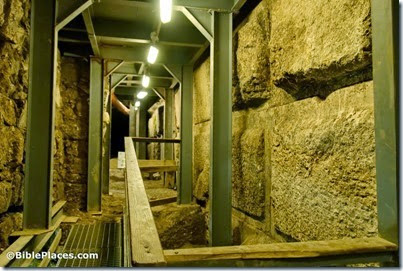Archaeologists excavating in the area below Robinson’s Arch along the southern end of the Western Wall of the Temple Mount have discovered a metal chisel used to shape the stones in the first century.
The Israel Antiquities Authority has not issued a press release yet, but Haaretz has learned of the discovery.
Archaeologists have found a stonemason’s chisel that they believe may have been used by the builders of the Western Wall in Jerusalem.
Actually Eli Shukron, an archaeologist working for the Israel Antiquities Authority, found the chisel last summer while digging at the lower base of the Western Wall, south of the Western Wall courtyard. However, the IAA has preferred to remain silent on the discovery, based on the need to study the tool and other evidence further before issuing any statements, it explained.
Shukron has been digging in the area of the City of David and the Western Wall together with Prof. Ronny Reich for the past 19 years, until a few months ago. In recent years Shukron had been excavating inside a tunnel found to lead from the City of David into the Old City, passing beneath its massive stone wall and ending at the Western Wall.
[…]
The chisel is just one of many archaeological treasures that Shukron and Reich reported from the area. Other finds include a Roman sword, cooking vessels from the period of the Great Rebellion, a gold bell that they think may have adorned the robe of the High Priest, and a ceramic seal apparently used to confirm the suitability of sacrifices brought to the Temple.
[…]
“People pray and kiss these holy stones every day, but somebody carved them, somebody chiseled them, somebody positioned them,” Shukron says. “They were workers, human beings, who had tools. Today for the first time we can touch a chisel that belonged to one of them.”
The full article in Haaretz (registration/subscription required) explains the basis for dating the construction of the Western Wall of the Temple Mount to one of the rulers after King Herod.
HT: Joseph Lauer

Photo by Clara Amit, Israel Antiquities Authority
